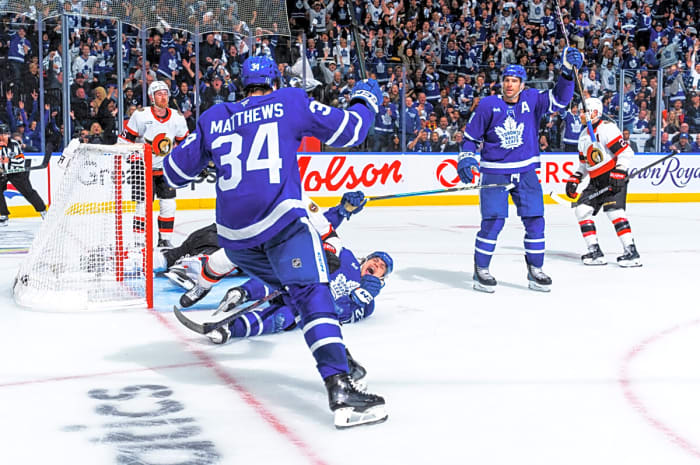
John Tavares made headlines across Toronto this week—not because he’s leaving, but because he’s staying. The Toronto Maple Leafs‘ former captain signed a four-year contract extension with an average annual value of $4.38 million. For many fans, it’s not just a deal. It’s a statement.
In an era where players often chase the biggest possible payday, Tavares chose something else: stability, purpose, and the chance to win in his hometown. For an elite star who’s worn the “C” with consistency and character, until he was asked to give it up to Auston Matthews, this new deal reflects everything he’s brought to the Maple Leafs since 2018.
A Hometown Star Stays on His Own Terms
For months, speculation swirled around Tavares’ future. Would the Toronto Maple Leafs walk away from their aging ex-captain? Would he hold out for market value? Could he still contribute in a top-six role? But from the outset, Tavares made his intentions clear: he wanted to stay and was willing to take less to make that happen.
There were hiccups in the negotiations—some internal back-and-forth over term and salary cap structure—but the outcome was always trending in the same direction. Tavares reportedly left significant money on the table—perhaps $2 to $3 million per year. Rumours suggested he could have fetched a contract north of $7 million annually on the open market, similar to the deal Brock Nelson signed with the Colorado Avalanche.
But that wasn’t what he wanted. Tavares knew exactly what he was doing—and he did it willingly. At this point in his career, he’s not chasing the last dollar. He’s chasing a Stanley Cup. Would he sacrifice a couple of million dollars a year if it gave his team a better shot at winning in May? Of course, he would. And that’s exactly what he did.
Tavares Leads by Example—Again
This is what Tavares has always done. From the day he arrived in Toronto, he’s played the game correctly: winning faceoffs, battling on the wall, taking tough assignments, making himself a target in front of the opposing goalie, and anchoring a team of stars with quiet, dependable leadership. While Matthews and Mitch Marner grabbed headlines, Tavares did the gritty, essential work that turns good teams into great ones.
This contract extension is more of the same. It’s not flashy. It won’t make highlight reels. But it sends a message to his teammates, to the front office, and to the fan base: this is what it means to put the team first.

And he didn’t just accept this deal—he chose it. Fully aware that the money left on the table might help the Maple Leafs add a reliable defender or a valuable depth forward, Tavares leaned into that reality. Like Mark Giordano before him, he got the big picture. And he acted on it.
Maple Leafs Fans Recognize the Moment
The response across Maple Leafs Nation was overwhelmingly positive. We asked fans across social media what they thought of the deal, and hundreds responded. For thoughtful fans, what came through loud and clear was gratitude—gratitude for a player who still believes in this team and wants to finish the job he started.
There was little hand-wringing about his age or speed. Fans appreciated the deal’s structure and recognized the rare humility in a player of his stature who was taking less to stay. Some even called it the kind of deal that will age gracefully, especially if Tavares transitions into more of a shutdown or third-line center role over time.
A Sign of the Times in Toronto’s Front Office
That said, there’s something else worth noting—something more complicated. The fan in me is excited about the structure and flexibility this deal gives the Maple Leafs. But I’d be lying if I said I didn’t notice the quiet shift in how this front office now operates. Under general manager Brad Treliving, there’s a firmer edge in negotiations. Loyalty isn’t just respected—it’s expected to come with a discount.
It’s fair to wonder if the organization leaned on Tavares’ commitment just a little, not by force, but as a call to reshape the culture. Like Giordano before him, the assumption seemed to be: “Of course he’ll take less. He wants to win. He knows the cap is tight.” And he did.

But here’s the key: Tavares didn’t feel pressured—he felt purposeful. He wasn’t squeezed. He was informed, experienced, and deeply committed. He made this decision with clear-eyed logic. And that should be celebrated in an era where the salary cap is finite.
An Ex-Captain’s Legacy That Will Last
With the captain signed and the message sent, attention turns to the next tasks—re-signing Matthew Knies, perhaps even making a final call on Marner, and building a roster that can do more than compete. But that’s for next week.
Today’s post acknowledges Tavares—not just for his goals or the faceoffs he’s won, but for what he represents. He came home. He stayed home. And once again, he put the Maple Leafs first.
More must-reads:
- Five worst signings from the first day of NHL free agency
- Best, worst value contracts signed so far in NHL free agency
- The 'First-overall NHL Draft picks' quiz
Breaking News
Trending News
Customize Your Newsletter
 +
+
Get the latest news and rumors, customized to your favorite sports and teams. Emailed daily. Always free!








